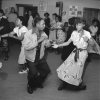Film
Northern Lights
These unusual feature films and documentaries have been selected by Ron Foley Macdonald to compliment the exhibition The Idea of North. Nordic, Japanese and Canadian filmmakers present exciting, bizarre and, occasionally, transcendent views of the North — an ever-present backdrop to the often all-too-human action of the narratives.
18 January Atanarjuat (The Fast Runner)
Zacharias Kunuk, Canada, 2001, 141 minutes. A multiple award-winner, the stunningly beautiful Atanarjuat is Canada's first feature-length fiction film written, produced, directed, and acted by Inuit. An exciting action thriller set in the Arctic in ancient Igloolik, the film unfolds as a life-threatening struggle between powerful natural and supernatural characters. In Inuktitut with English subtitles.
25 January Cold Fever
Fridrik Thor Fridiksson, Iceland/USA, 1995, 86 minutes. In this absurdist road movie, a Japanese man honours his parents’ last wishes by performing ancestry rites at the place of their passing — a remote corner of Iceland. Produced and co-written by American Indie icon James Stark and directed by Iceland's Fridrik Thor Fridriksson, this engaging film stars Japanese matinée idol Masatoshi Nagase.
1 February Ingmar Bergman Makes A Movie
Vilgot Sjoman, Sweden, 1962, 145 minutes. Swedish director Sjoman (I Am Curious (Yellow) and (Blue)) followed the modernist auteur Ingmar Bergman through the writing, direction and launch of his chilly existentialist masterpiece Winter Light, crafting a startling series for European television. This compelling and intimate examination of Scandinavian cinematic aesthetics is required viewing for all serious students of the cinema.
8 February No Such Thing
Hal Hartley, USA/Canada/Iceland, 2001, 101 minutes. In this Northern retelling of the story of Beauty and the Beast, American Indie director Hal Hartley follows a young journalist (Sarah Polley) as she survives a plane crash and confronts a grizzled monster on an offshore Icelandic island. One of Hartley’s least-known works, it is nevertheless full of his trademark dry humour and existential angst.
15 February White Thunder
Victoria King, Canada, 2002, 52 minutes. The story of New York-based filmmaker Varrick Frissell, who, in the 1920s, fell in love with the North (particularly Labrador) and helmed a major Hollywood production on the seal hunt called The Viking. Returning in March 1931 to shoot second unit footage, his ship exploded, causing his death; many of his crew also perished. An example of Frissell’s early work, The Lure of Labrador (1926, 13 minutes) will follow.
22 February The Viking
Varrick Frissell, USA/Canada, 1931, 70 minutes. Paramount Pictures salvaged a feature drama from the wreckage of Varrick Frissell's final shoot, releasing it in 1931 as a conventionalized romance. The footage of the swelling ocean underneath the sea-ice still manages to astonish; filming in March on the ice-floes was indeed an extraordinary challenge for the Hollywood crew.
1 March and 8 March: no films due to exhibition installation
15 March White Dawn
Philip Kaufman, USA/Canada, 1974, 109 minutes. This key early film from the director of The Right Stuff and The Unbearable Lightness of Being is adapted from James Huston's famous book about the collision of cultures in Canada's North. Three whalers (played by Timothy Bottoms, Louis Gossett Jr. and Warren Oates) are stranded in an Inuit encampment after a shipboard mishap. As they await rescue, the clash of personalities and cultures takes its toll.
22 March Dersu Uzala
Akira Kurosawa, Japan/USSR, 1975, 137 minutes. A masterful film by a major director, Dersu Uzala tells the story of a Czarist-era surveyor and his Mongol guide as they battle the elements in order to make viable maps for the eventual exploitation of the area's resources. Kurosawa’s unusual “buddy” film focuses primarily on landscape and mood rather than on interpersonal conflicts.
29 March Never Cry Wolf
Carroll Ballard, USA/Canada, 1983, 105 minutes. Farley Mowat's landmark autobiographical novel made it to the screen with most of its dignity—and environmental message—intact. A neophyte biologist (James Martin Smith) is stationed near the Arctic Circle in Canada to research whether wolves are indeed ravaging the Caribou herds. His surprising encounter with the natural world is full of quiet, powerful detail.
5 April The Man Without A Past
Aki Kaurasmaki, Finland/France/Germany, 2002, 97 minutes. In this recent art-house classic, a man's past becomes obliterated after he is robbed by a roving street gang in an unnamed Northern European city. The man recovers by living in a shipping container and slowly building a completely new life. The film is illuminated by director Kaurasmaki’s trademark laconic humour and restraint.
12 April Mon Oncle Antoine
Claude Jutra, Canada, 1971, 110 minutes. Still considered among the best of Canadian feature films, Claude Jutra's masterpiece looks at the realities of small-town 1940s Quebec through the eyes of a nearly-silent, impressionable young man.




